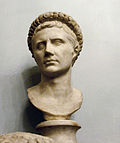Emperor of Rome
| Emperor of the Roman Empire | |
|---|---|
|
Imperial
|
|

Vexillum
|
|

Augustus
|
|
| Details | |
| Style | Imperator, Augustus, Caesar, Princeps, Dominus Noster, Autokrator or Basileus (depending on period) |
| First monarch | Augustus |
| Last monarch |
Theodosius I (Unified or Classical), Zeno (Unified), Romulus Augustulus (Western), Constantine XI (Eastern) |
| Formation | 16 January 27 BC |
| Abolition | 17 January 395 AD (Unified or Classical), 4 September 476 AD (Western), 29 May 1453 AD (Eastern) |
| Pretender(s) | None |
The Roman emperor was the ruler of the Roman Empire during the imperial period (starting in 27 BC). The emperors used a variety of different titles throughout history. Often when a given Roman is described as becoming "emperor" in English, it reflects his taking of the title Augustus or Caesar. Another title often used was imperator, originally a military honorific. Early Emperors also used the title princeps (first citizen). Emperors frequently amassed republican titles, notably Princeps Senatus, Consul and Pontifex Maximus.
The legitimacy of an emperor's rule depended on his control of the army and recognition by the Senate; an emperor would normally be proclaimed by his troops, or invested with imperial titles by the Senate, or both. The first emperors reigned alone; later emperors would sometimes rule with co-Emperors and divide administration of the Empire between them.
The Romans considered the office of emperor to be distinct from that of a king. The first emperor, Augustus, resolutely refused recognition as a monarch. Although Augustus could claim that his power was authentically republican, his successor, Tiberius, could not convincingly make the same claim. Nonetheless, for the first three hundred years of Roman Emperors, from Augustus until Diocletian, a great effort was made to emphasize that the Emperors were the leaders of a Republic.
From Diocletian onwards, emperors ruled in an openly monarchic style and did not preserve the nominal principle of a republic, but the contrast with "kings" was maintained: although the imperial succession was generally hereditary, it was only hereditary if there was a suitable candidate acceptable to the army and the bureaucracy, so the principle of automatic inheritance was not adopted. Elements of the Republican institutional framework (senate, consuls, and magistrates) were preserved until the very end of the Western Empire.
The Eastern (Byzantine) emperors ultimately adopted the title of "Basileus" (βασιλεύς), which had meant king in Greek, but became a title reserved solely for the Roman emperor and the ruler of the Sasanian Empire. Other kings were then referred to as rēgas.
...
Wikipedia
